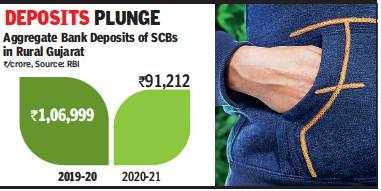- News
- City News
- ahmedabad News
- Need for cash hits bank deposits in rural Gujarat
Need for cash hits bank deposits in rural Gujarat

Representative image
AHMEDABAD: With people keeping more cash in hand due to pandemic-induced uncertainties and anticipated emergencies, bank deposits in rural Gujarat plummeted by 15% in 2020-21. The reduction was further fuelled by loss of employment resulting from the return of migrant workers to their villages.

The aggregate bank deposits of scheduled commercial banks (SCBs) in rural areas across the state declined to Rs 91,212 crore in fiscal 2020-21 from Rs 1.06 lakh crore in 2019-20, the Reserve Bank of India (RBI) data shows.
The first quarter of fiscal 2021, when the nationwide lockdown was imposed to curb Covid-19 spread saw aggregate bank deposits drop by 21% to Rs 84,653 crore over the preceding quarter. This indicated cash withdrawals worth Rs 22,346 crore in one quarter alone.
"Uncertainty due to the lockdown, anticipated emergencies and Covid led to panic withdrawal in rural areas, causing aggregate deposits to decline. Bank branches in rural Gujarat were at a distance and access due to lockdown restrictions was an issue. This led people to withdraw huge sums of money," said a source in State Level Bankers' Committee (SLBC) - Gujarat.
The decline in bank deposits was reported across 20 districts including Ahmedabad, Amreli, Banaskantha, Bharuch, Rajkot, Surat, Kheda, Mehsana, Morbi and Patan, among others.
"However, the deposits picked up from the second quarter as agriculture sector revived. But growth rate remained slow. Out of fear people held on to cash reserves. Another reason for decline in deposits is also the reclassification of bank branches from rural to semi-urban areas," said MM Bansal, convener, SLBC - Gujarat.
According to banking industry sources, migrant exodus and fear of another shutdown led to withdrawal of hefty sums and slower rate of deposits.
"Lockdown was a major uncertainty factor for rural populace and they need cash to purchase seeds and fertilizers, being hevily dependent on agriculture. Many faced difficulties in accessing cash and thus, withdrew more money. On the other hand, even as agriculture output was good yielding them good returns, little portion of the funds were diverted to bank deposits," said a source in a public-sector bank.
Migrant exodus was also a reason for decline in deposits and slower revival. "Many migrants lost their jobs and returned to their home state without a source of income. This eroded savings and increased consumption and in turn cash requirement in rural households went up. Moreover, the tendency of not parting with cash in uncertain situations prevailed causing deposits to decline," said Jayshree Vyas, managing director, SEWA bank.
The aggregate bank deposits of scheduled commercial banks in Gujarat grew 11% from Rs 7.63 lakh crore in 2019-20 to Rs 8.47 lakh crore in 2020-21, suggests RBI data. Except rural areas, deposits went up in semi-urban, urban and metropolitan areas.

The aggregate bank deposits of scheduled commercial banks (SCBs) in rural areas across the state declined to Rs 91,212 crore in fiscal 2020-21 from Rs 1.06 lakh crore in 2019-20, the Reserve Bank of India (RBI) data shows.
The first quarter of fiscal 2021, when the nationwide lockdown was imposed to curb Covid-19 spread saw aggregate bank deposits drop by 21% to Rs 84,653 crore over the preceding quarter. This indicated cash withdrawals worth Rs 22,346 crore in one quarter alone.
"Uncertainty due to the lockdown, anticipated emergencies and Covid led to panic withdrawal in rural areas, causing aggregate deposits to decline. Bank branches in rural Gujarat were at a distance and access due to lockdown restrictions was an issue. This led people to withdraw huge sums of money," said a source in State Level Bankers' Committee (SLBC) - Gujarat.
The decline in bank deposits was reported across 20 districts including Ahmedabad, Amreli, Banaskantha, Bharuch, Rajkot, Surat, Kheda, Mehsana, Morbi and Patan, among others.
"However, the deposits picked up from the second quarter as agriculture sector revived. But growth rate remained slow. Out of fear people held on to cash reserves. Another reason for decline in deposits is also the reclassification of bank branches from rural to semi-urban areas," said MM Bansal, convener, SLBC - Gujarat.
According to banking industry sources, migrant exodus and fear of another shutdown led to withdrawal of hefty sums and slower rate of deposits.
"Lockdown was a major uncertainty factor for rural populace and they need cash to purchase seeds and fertilizers, being hevily dependent on agriculture. Many faced difficulties in accessing cash and thus, withdrew more money. On the other hand, even as agriculture output was good yielding them good returns, little portion of the funds were diverted to bank deposits," said a source in a public-sector bank.
Migrant exodus was also a reason for decline in deposits and slower revival. "Many migrants lost their jobs and returned to their home state without a source of income. This eroded savings and increased consumption and in turn cash requirement in rural households went up. Moreover, the tendency of not parting with cash in uncertain situations prevailed causing deposits to decline," said Jayshree Vyas, managing director, SEWA bank.
The aggregate bank deposits of scheduled commercial banks in Gujarat grew 11% from Rs 7.63 lakh crore in 2019-20 to Rs 8.47 lakh crore in 2020-21, suggests RBI data. Except rural areas, deposits went up in semi-urban, urban and metropolitan areas.
FacebookTwitterLinkedinEMail
Start a Conversation
end of article
Quick Links
Delhi Air PollutionDelhi TemperatureChennai WeatherBangalore TemperatureCovid vaccination centres in DelhiCoronavirus in DelhiRTPCR test in GurgaonHyderabad RainPollution level in BangaloreDelhi SmogDelhi TemperatureNoida AQIGurgaon AQI todayFire in MumbaiMumbai RainsCovid 19 RT PCR Test in NoidaDelhi AQI todaySrinagar encounter
